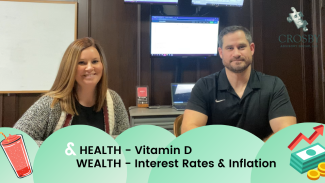
H&W: Vitamin D, Interest Rates & Inflation
Health
A recent trip to my primary care doctor inspired our health and wealth for this week! Did you know that many Ohioans are deficient in vitamin D, and in the Winter, that deficiency gets worse due to lack of sunlight? It seems so obvious but yet never crossed my mind - until now.
Why is vitamin D essential to us?
- It helps to absorb calcium in our body which helps to keep our bones strong
- Having sufficient vitamin D levels is said to lower the risks of osteoporosis, MS, chronic pain, diabetes, rheumatoid arthritis, and some cancers (that doesn't mean it is the cause of these issues, just that it may help lower the risk)
- Influences cell growth
- Helps immune function
- Keeps inflammation in check
- Keeps nervous system working properly
- With the COVID pandemic, doctors suggest making sure to include vitamin D in your supplements because since it helps immune function, it can help to fight off the virus.
Here are some symptoms of a vitamin D deficiency:
- Fatigue
- Bone or back pain
- Getting sick with flu or cold often
- depression/anxiety
- Wounds that are slow healing
What can you do to increase your Vitamin D levels?
- Take supplements. Your doctor can order vitamin D levels to be checked in your routine blood work. As I said, I recently had this done and my levels were very low. I now take 3000 IU of vitamin D per day. The Mayo Clinic recommends anywhere from 600-2000 IU of vitamin D per day. This is why asking for your levels to be checked in your blood work might be beneficial.
- Pro tip: I take mine at night and find that I have more energy in the morning!
- Eat foods rich in Vitamin D
- Fatty fish: cod, tuna, salmon
- Dairy fortified with Vitamin D
- Beef liver
- Egg yolk
- Adequate exposure to sunlight
- In Ohio this is basically impossible in Winter. 20-30 minutes a day of sunlight can do wonders for your intake.
- Diet and supplements are your best bet for vitamin D throughout winter.
- Pro tip: be sure to wear your sunscreen anytime you are out in the sun for extended periods of time!
Wealth
We receive a lot of questions from clients and will address some of the most common ones in our Wealth section. Today we heard from Mike in Missouri with a question of: Why do stocks care about interest rates?
To answer this one, let’s first take a step back. The Federal Reserve controls interest rates in the US and has a dual mandate:
- keep employment at a maximum sustainable level
- make the cost of things relatively stable
The inflation rate is measured / reported monthly by the Consumer Price Index & the Bureau of Labor Statistics. The goal is 2% and we are currently at 7%.
Within the Federal Reserve there is a branch called the Federal Open Market Committee. Their primary function is to decide monetary policy - meaning are they increasing or decreasing interest rates. As interest rates rise the cost of business becomes more expensive, making it harder for someone to get a loan and therefore slows down the economy. Alternatively, if they want to speed up the economy then interest rates will lower.
We’ve been in a period of low interest rates which has helped businesses to get loans and to invest and therefore has helped the stock market.
So, to answer your question, Mike, stocks care about interest rates because the stock market is a forward-looking instrument. If it sees that interest rates are going up then it worries that businesses will cut into their profits margins and thus may result in stock market headwinds.
Sources:
Vitamin D - Mayo Clinic

